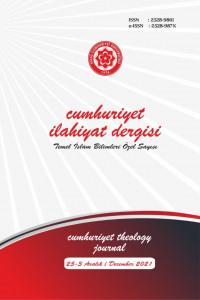Hayızlı Kadının Orucu Meselesi: ‘Sen Harûrî Misin?’ Rivayeti Üzerine Bir İnceleme
Women's Fasting During Menstruation: A Review on the Narration ‘Are You Ḥarūrī?’
Author(s): Rabia Zahide TemizSubject(s): Islam studies, Religion and science , Philosophy of Religion, Contemporary Islamic Thought
Published by: Cumhuriyet Üniversitesi İlahyat Fakültesi
Keywords: Ḥadīth; Riwāya; Menstruation; Fasting; Ḥarūrī;
Summary/Abstract: Fasting of women on the days of her menstruation period is an issue that takes place in current fiqh discussions. Some contemporary researchers say that there is no religious obstacle for women to fast during these times. Moreover, they state that there is no reason to interrupt fasting, on the contrary, claim obliged to fasting. Meanwhile in traditional fiqh, it is stated that is religiously forbidden for women to fast during this period, rather it is claimed that fasting in this period is ḥaram. The evidence brought to the views of all the mujtahids, who expressed their opinions on this matter was a narration from ʿĀʾisha Bint Abī Bakr (d. 58/678), a wife of Prophet (p.b.u.h). When a woman asked her if she should have fulfilled her ṣalāt (prayer) later, which she could not perform while she was in menstruation period, she responded to her as “are you Ḥarūrī?” then explained the answer. In some variants of this narration, matter of fasting is included in the question or answer. In this article, the issue of women's fasting during menstruation is discussed from a perspective based on isnād-matn analysis in the context of this narration which is called the “Ḥarūrī Ḥadīth”. In the matn of 71 riwāya identified on this article, it has been determined that the issue of fasting was added to the matns narrated by Ma'mer bin Rās̲h̲ id and to some other narrations which in their corroborative (mutābī) matns not includes fasting. In later times, the version of the text with the mention of fasting was accepted as the original and became the proof that fasting of the menstruating woman was forbidden by religion. Considering the hadiths, which do not include issue of fasting, it is seen that the woman tābiʿī (Successor of the Companions) named Muâze asked ʿĀʾisha what the sunnah was about menstruating woman’s ṣalāt. Because in that era a sect called K̲h̲ārid̲j̲ites had claimed that women had to fulfill the ṣalāt that they could not perform during their menstruation, later. There are also other narrations mention the fasting of the menstruating woman. All these narrations indicated that the Prophet did not forbid fasting when menstruating, on the contrary, he just pointed out that fasting was interrupted due to menstruation. As fasting is not a worship like ṣalāt from which the woman is exempted from, a woman may interrupt fasting but must unconditionally fulfill this worship later. Thus, the situation of a woman in such a situation is equaled to the sufferer and the travelers who have a break from fasting. It is stated in traditional fiqh that a menstruating woman will not have to perform ṣalāts later that she couldn't fulfill in time. The necessity of performing a worship must be determined by a clear order of the prophet. However, a clear order regarding the prohibition of fasting during menstruation was not sought. Consequently, it is seen that the narrations are more clear evidence of the absence of any prohibition than they reveal the prohibition of fasting. It has been emphasized in the narratives that it is permissible for a woman to postpone her fast, but she is absolutely obliged to compensate the fasts that she did not fulfill, and she is not exempt from fasting as she is exempt from ṣalāt.
Journal: Cumhuriyet İlahiyat Dergisi
- Issue Year: 25/2021
- Issue No: 3
- Page Range: 1253-1275
- Page Count: 23
- Language: Turkish

